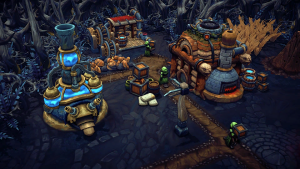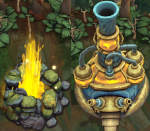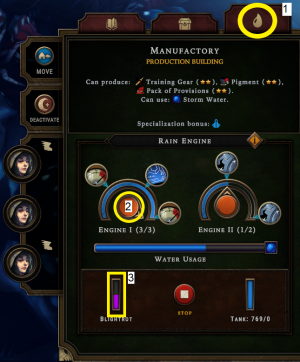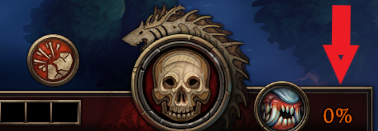Rainpunk: Difference between revisions
| Line 124: | Line 124: | ||
On the left is a Blightpost, an essential [[Building]] used to produce [[File:Icon Resource PurgingFire.png|16px]] Purging Fire which Blightfighters (Villagers assigned to the Blightpost) then use to burn off Blight Cysts during the [[Storm Season]]. Viceroys can also build a Hydrant to store extra Purging Fire near buildings that have grown a lot of Cysts. {{rl|Purging Fire}} is made by using {{rl|Coal}} , {{rl|Sea Marrow}}, {{rl|Oil}} or {{rl|Wood}}. | On the left is a Blightpost, an essential [[Building]] used to produce [[File:Icon Resource PurgingFire.png|16px]] Purging Fire which Blightfighters (Villagers assigned to the Blightpost) then use to burn off Blight Cysts during the [[Storm Season]]. Viceroys can also build a Hydrant to store extra Purging Fire near buildings that have grown a lot of Cysts. {{rl|Purging Fire}} is made by using {{rl|Coal}} , {{rl|Sea Marrow}}, {{rl|Oil}} or {{rl|Wood}}. | ||
A single Blightpost can handle a maximum of approximately 20-25 Blightrot Cysts per [[Storm Season]] on Veteran to Prestige 10 difficulty (this number goes down to around 15 at Prestige 11 and above). Beyond this point, multiple Blightposts will be needed. | A single Blightpost can handle a maximum of approximately 20-25 Blightrot Cysts per [[Storm Season]] on Veteran to Prestige 10 difficulty (this number goes down to around 15 at Prestige 11 and above). Beyond this point, multiple Blightposts will be needed.<br /><br /><br /><br /><br /> | ||
==== The Hydrant ==== | |||
The exact number of cysts a Blightpost can handle varies depending on the movement speed and Global Work Speed of your Blight Fighters, and also by cyst location – the less time your Blight Fighters spend walking between the Blight Post and the cysts, the more cysts they will be able to burn. A well-placed Hydrant will greatly reduce this travel time, and may be essential if the distance between your Blightpost and the infested buildings is too great. | [[File:Hydrant icon.png|left|thumb|150px|A Hydrant]] The exact number of cysts a Blightpost can handle varies depending on the movement speed and Global Work Speed of your Blight Fighters, and also by cyst location – the less time your Blight Fighters spend walking between the Blight Post and the cysts, the more cysts they will be able to burn. A well-placed Hydrant will greatly reduce this travel time, and may be essential if the distance between your Blightpost and the infested buildings is too great. | ||
{{Species link|Harpies}} in a Blightpost have a +10% chance to double their Purging Fire production, and {{Species link|Lizards}} in a Blightpost get +5 to their Resolve. | {{Species link|Harpies}} in a Blightpost have a +10% chance to double their Purging Fire production, and {{Species link|Lizards}} in a Blightpost get +5 to their Resolve. | ||
Revision as of 13:12, 22 November 2023
Overview
Viceroys can now take advantage of the Rain to power their buildings, but not without a cost! Blightrot will grow in Rain Engines as Viceroys use them, the more Rainwater that runs through an engine, the faster ![]() Blightrot Cysts will spawn. While Rainpunk is essential for any Viceroy playing on higher difficulties, it is a delicate balance between using Rainwater Engines and keeping the Blightrot at bay, as Blightrot likes to eat villagers. Blightrot scales with difficulty, so prepare to fight for your life at higher Prestige levels...
Blightrot Cysts will spawn. While Rainpunk is essential for any Viceroy playing on higher difficulties, it is a delicate balance between using Rainwater Engines and keeping the Blightrot at bay, as Blightrot likes to eat villagers. Blightrot scales with difficulty, so prepare to fight for your life at higher Prestige levels...
Types of Rainwater
There are 3 types of Rainwater, each type will power different types of buildings. ![]() Drizzle Water powers buildings that produce food,
Drizzle Water powers buildings that produce food, ![]() Clearance Water powers crafting and artistry buildings, and
Clearance Water powers crafting and artistry buildings, and ![]() Storm Water powers heavy industrial buildings producing fuels and metals.
Storm Water powers heavy industrial buildings producing fuels and metals.
Sourcing Rainwater
There are two ways of sourcing Rainwater:
- Collecting Rainwater from the sky via buildings such as the Rainwater Collector and Advanced Rainwater Collector.
- Building Geyser Pumps on top of Water Geysers.
Rainwater Collectors
Most players will start with building a Rain Collector that collects Rainwater during the season. Collection is based on seasons, so ![]() Storm water can only be collected during the Storm Season, and so forth. Rain Collectors have tanks with a capacity of 50 units and collect 2 units every 16 seconds, and Advanced Rain Collectors, which you unlock in later levels, has double the capacity and speed.
Storm water can only be collected during the Storm Season, and so forth. Rain Collectors have tanks with a capacity of 50 units and collect 2 units every 16 seconds, and Advanced Rain Collectors, which you unlock in later levels, has double the capacity and speed.
Rainwater Geysers
Geyser Pumps are buildings you can place on top of Rainwater Geysers to collect Rainwater, they have a base capacity of 50 units, upgradable to 200 units. Geysers produce 2 units of water every 6 seconds. They have two worker slots, upgradable to place Automatons in worker slots for uninterrupted collection. It is important to note that a Rainwater Geyser will only produce Rainwater of the type that is the colour of the geyser, it does not change with seasons.
Engine Usage
Viceroys can control how much water, and for what purpose, is used in a Building. To the left we can see a Viceroy clicked on the 3rd panel of a Building information box to open the engine controls of a Manufactory.
Here you can select which perks you would like to enjoy when using Rainwater, as well as how much Rainwater you would like to use. On the bottom left of the information box, we can see a Blightrot meter. This meter shows you how much Blightrot your engines are spawning.
Engine Controls are as follows:
Left:
- 1 - Increase production speed by 50%.
- 2 - Increase chance of double production yields by 25%.
- 3 - Increase production speed by a further 50%.
Right:
It is important to note that as long as there are workers assigned and the engines are turned on, the Rainwater will be used and Blightrot will generate, even if no products are being produced.
Blightrot
Blightrot generates Blight Cysts and these cysts generate Hearth Corruption with continued Rainwater usage. The more water you use, the more Blight Cysts and Corruption generate. You can view your Hearth Corruption percentage on the bottom right of your screen. Clicking on the ![]() Icon will take you to the Hearth Corruption information page, where you can view how many Blightrot Cysts have generated as well as how much Blightrot generation you can spare until 3 random Villagers die.
Icon will take you to the Hearth Corruption information page, where you can view how many Blightrot Cysts have generated as well as how much Blightrot generation you can spare until 3 random Villagers die.
From Veteran to Prestige 10 difficulty, the rate of Corruption generation is 60% Corruption a minute per Blightrot Cyst. It multiplies by 1.5x starting from Prestige 11.
Blightpost, Blightfighters and Purging Fire
On the left is a Blightpost, an essential Building used to produce ![]() Purging Fire which Blightfighters (Villagers assigned to the Blightpost) then use to burn off Blight Cysts during the Storm Season. Viceroys can also build a Hydrant to store extra Purging Fire near buildings that have grown a lot of Cysts.
Purging Fire which Blightfighters (Villagers assigned to the Blightpost) then use to burn off Blight Cysts during the Storm Season. Viceroys can also build a Hydrant to store extra Purging Fire near buildings that have grown a lot of Cysts. ![]() Purging Fire is made by using
Purging Fire is made by using ![]() Coal ,
Coal , ![]() Sea Marrow,
Sea Marrow, ![]() Oil or
Oil or ![]() Wood.
Wood.
A single Blightpost can handle a maximum of approximately 20-25 Blightrot Cysts per Storm Season on Veteran to Prestige 10 difficulty (this number goes down to around 15 at Prestige 11 and above). Beyond this point, multiple Blightposts will be needed.
The Hydrant
The exact number of cysts a Blightpost can handle varies depending on the movement speed and Global Work Speed of your Blight Fighters, and also by cyst location – the less time your Blight Fighters spend walking between the Blight Post and the cysts, the more cysts they will be able to burn. A well-placed Hydrant will greatly reduce this travel time, and may be essential if the distance between your Blightpost and the infested buildings is too great.
![]() Harpies in a Blightpost have a +10% chance to double their Purging Fire production, and
Harpies in a Blightpost have a +10% chance to double their Purging Fire production, and ![]() Lizards in a Blightpost get +5 to their Resolve.
Lizards in a Blightpost get +5 to their Resolve.
Blightrot Cysts and Removal
Blightfighters (Villagers assigned to the Blightpost)) will burn Blightrot Cysts with ![]() Purging Fire produced in the Blightpost. This will remove Corruption.
Purging Fire produced in the Blightpost. This will remove Corruption.
On the left is a closed Blightrot Cyst, cysts will remain closed during Drizzle Season and Clearance Season, and they are invulnerable during this time. On the right is an open Blightrot Cyst, cysts will open during the Storm Season, and they are now vulnerable and able to be burned off with ![]() Purging Fire by Blightfighters.
Purging Fire by Blightfighters.
Difficulty Modifiers influencing Blightrot
| Difficulty Modifier | Description | Explanation |
|---|---|---|
Prestige 3 |
Large swathes of Blightrot migrates accross the realm. | Every 3rd Clearance Season, X amount of Blightrot Cysts will spawn. |
Prestige 11 |
The Blightrot's impact is stronger. | Blightrot Cyst generation rate is now increased by 100%, the Hearth corrupts +50% quicker than normal and all effects that spawn Blightrot now add twice as many Cysts. |
Forest Mysteries and Blightrot
| Forest Mystery | Description | Explanation |
|---|---|---|
 Natural Filtration |
Using Rain Engines causes a lot less Blightrot contamination due to the natural filtration processes of the surrounding vegetation. | Blightrot Cysts grow X% slower when using Rain Engines. |
 Rotten Vapors |
Machinery has to be cleaned with specially prepared Drizzle Water. Otherwise, Blightrot will spread. | Once this effect activates, you have to pay X amount of |
 Rot from the Sky |
The rain smells like Blightrot... | Global food production is slowed by X for each Hostility level. |
 Spreading Contamination |
Blightrot contaminates everything you send to the Citadel. | During the storm, the Queen's Impatience grows X faster for every Blightrot Cyst in your settlement. |
 Blightrot Infection |
Villagers report feeling sick, especially during the storm. | When a villager leaves or dies, X Blightrot Cysts will appear in the settlement. |
 Absorption |
Blightrot Cysts consume the storm's energy and become more resilient. | Burning cysts takes X seconds longer. |
 Blight from the Sky |
Blightrot seems to grow uncontrollably quickly in this region. | Every storm season, X Blightrot Cysts appear in the settlement (multiplied by the number of years that have passed). |
Glade Events and Blightrot
Perks, Cornerstones and Blightrot
| Cornerstone | Description | Explanation |
|---|---|---|
 Amber for Water |
Apparently, there is a technique for extracting crystals similar to Amber from rainwater. | Gain 10 |
 Blight Filter |
A crystalline filter designed to mitigate the negative environmental impact of infused rainwater.. | Blightrot Cysts appear 50% slower when using rain engines, but Reputation from Resolve is generated 90% slower for the next 2 Reputation Points. |
 Burnt to a Crisp |
Gain 20 | |
 Baptism of Fire |
Every 3 burnt Blightrot Cysts lowers Hostility by ‑10. While the Hearth is corrupted, you’re unable to sacrifice resources. | |
 Effective Parasite |
Withered Tree Consequence | The Blightrot feeds on the tree's valuable nutrients, making new cysts much more resilient. Cysts burn for X seconds longer. |
 The Night's Embrace |
Altar of Decay Consequence | The settlement is slowly engulfed in darkness. Each Blightrot Cyst increases Hostility by X points during the storm. |
 Engine Corrosion |
Blightrot Cauldron Consequence | Contaminated liquid gets inside Rain Engines through underground pipes. Using water in Rain Engines generates Blightrot Cysts X quicker. |
 Straight to the Hearth |
Corrupted Caravan Consequence | Your settlement's strongest and weakest point has become a direct target for the Blightrot. Corruption in the Ancient Hearth grows X quicker. |
 Blightrot Outbreak |
Noxious Machinery Consequence | The explosion of the machine will not only destroy everything within a X field radius, but will also cause X Blightrot Cysts to spawn in the settlement. |
 Hooded Horse Wikis
Hooded Horse Wikis













